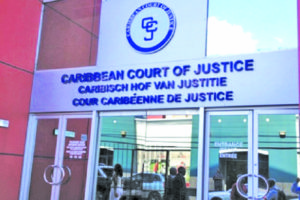The Caribbean Court of Justice (CCJ) has upheld a G$30 million court award of compensation to Deorani Singh on behalf of the estate of Mohan Pirtram Singh whose land was compulsorily acquired by the State over 35 years ago. However, the substantive appeal which carried the matter to the CCJ was dismissed by the Trinidadian-based court on Tuesday. The Attorney General (AG) and the State-owned National Industrial and Commercial Investment (NICIL) were the two named respondents.

The court found that none of the Appellant’s grounds of appeal succeeded and dismissed the appeal. The regional judicial arm however indicated that “the forensic reality is that the State was content to accept the decision reached by the Court of Appeal (judgment award) and, accordingly, it did not disturb that decision.
The Georgetown property, which was at the centre of contention, was the site where Mohan Singh operated his business until his death in 1980 and the then State entity, the Guyana Pharmaceutical Corporation (GPC) Limited, leased the property for five years. In a judgement summary issued by the CCJ on Tuesday, it was observed that the State, under the Acquisition of Lands for Public Purposes Act Chapter 62:05, compulsorily acquired the land from the Singh estate.
It was in 1984 that the State first sought to enquire from the High Court as to how much compensation should have been paid the original owners. A court ruling some three years later, in March 1987 fixed compensation in the amount of G$578,000 less the sum of G$496,850.13 which was already paid over to estate representatives which indicated that the total compensation was some G$1,074,850.
Further background into the decades-long case pointed that the said property was leased to Citizen’s Bank by GPC. Afterward in 2003, the property was taken over by NICIL. However, it was in 1997, some six years prior that Deorani Singh filed a High Court motion, challenging the State’s compensation, arguing that her and the estate’s fundamental rights and freedoms as observed by Articles 40 and 142 of the Constitution were “contravened”. She petitioned the court to have the acquisition declared as unconstitutional, null and void and to no effect.
Singh’s motion was heard in the High Court in 2002 and a judgement was delivered in 2010 by Justice Roy which viewed that the acquisition was unconstitutional and that passing the transport from the estate to GPC was a nullity. However, the then AG appealed the trial Judge’s decision but the Appeal Court upheld the High Court’s ruling and awarded G$30 million damages for the contravention meted out to Singh.
The CCJ highlighted that both the State and GPC “considered themselves as the lawful and genuine owners” of the property and that there was “considerable work done on the property” and two transfers of ownership. The court contended that it would be a “great injustice” to permit the appellant, Singh, to see an order to pronounce that the property was never acquired or vested in the State.
The CCJ however opined that there was significant delay in the judicial process as the constitutional motion was heard five years after it was filed in 2002 and judgment delivered in 2010 due to a missing file. The appeal was filed in 2010 and oral judgement was given seven years later in 2017 before the CCJ heard the matter in February 2018. The respondents were awarded basic costs.
Related posts
-

Ramkarran says GECOM’s 15-day deadline to announce results “not mandatory”
The 15-day deadline referenced in the Representation of the People Act, within which the Guyana Elections... -

Linden man knifes woman and lover to death in jealous rage
A man is in Police custody after he reportedly stabbed his ex-lover and her new spouse... -

Mottley says “there are forces that do not want to see votes recounted”
Chairperson of the Caribbean Community (Caricom), Barbadian Prime Minister Mia Mottley, in a strongly-worded statement said...
